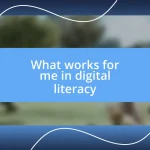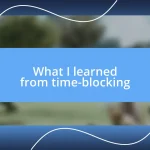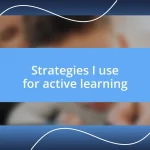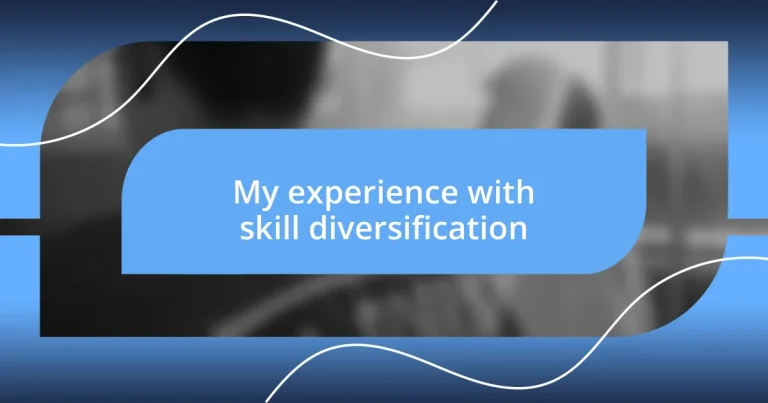Key takeaways:
- Skill diversification enhances adaptability, opening new opportunities and revitalizing passion through the integration of complementary skills.
- Identifying transferable skills increases confidence and job security, enabling individuals to pivot in their careers amid changing job markets.
- Future trends indicate a growing importance of interdisciplinary skills and technology, with remote learning fostering global collaboration and continuous growth.
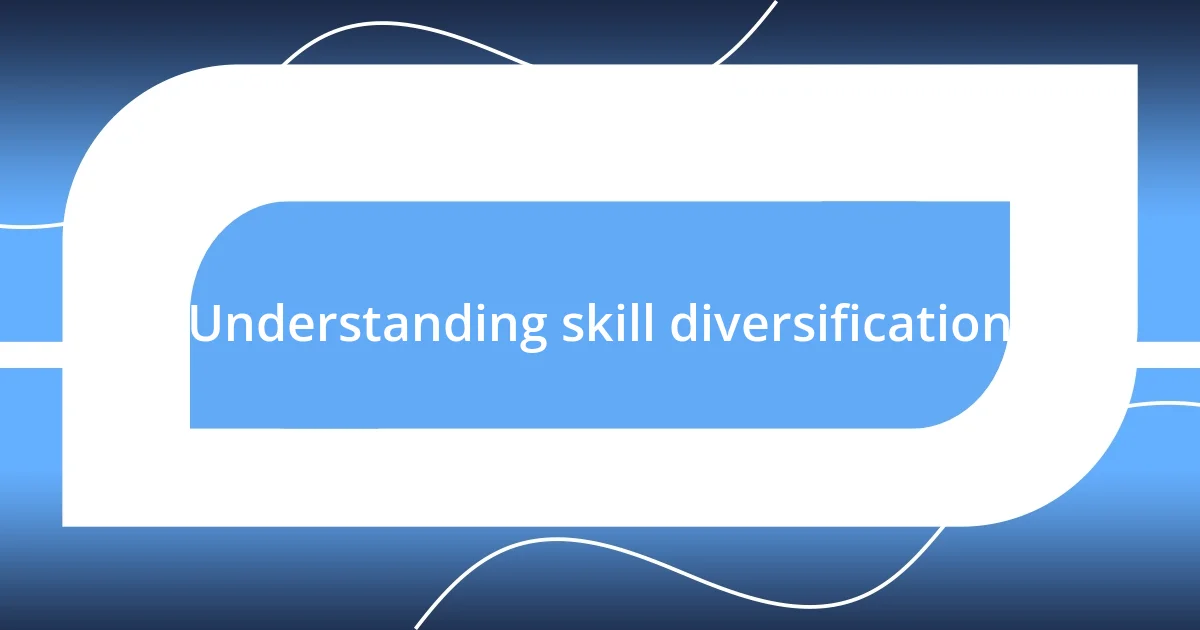
Understanding skill diversification
Skill diversification is much more than simply adding more tools to your belt; it’s about nurturing adaptability and resilience in an ever-changing landscape. I remember a time when I felt pigeonholed in my career, and it was a jarring experience that prompted me to explore areas outside my comfort zone. Have you ever found yourself wishing you had skills that would open up new opportunities?
When I started investing time in learning graphic design alongside my writing, the world seemed to expand. Suddenly, I was not just creating content; I was visually enhancing it, transforming my projects in ways I never imagined. This blend of skills didn’t just make me more marketable; it brought a refreshing sense of fulfillment and creativity that reignited my passion for my work. How often do we neglect the potential synergies between our existing skills and new ones?
Embracing skill diversification has taught me the value of continuous learning. There’s a thrill in feeling like a beginner again, questioning and exploring new concepts that invigorate my daily routine. Does the thought of stepping into unknown territory excite you, or does it seem daunting? I can assure you, those initial hesitations often give way to growth that enhances not only our professional lives but also our personal journeys.
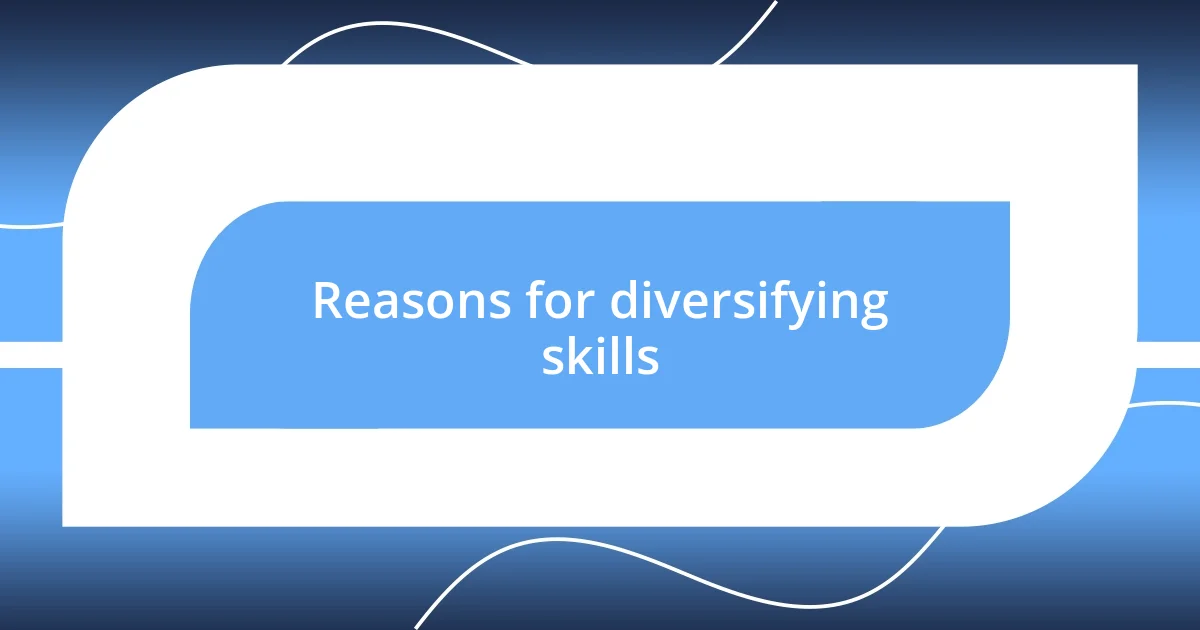
Reasons for diversifying skills
Skill diversification invites a myriad of opportunities that can alter the trajectory of your career. For instance, when I started learning coding, I found it opened doors I didn’t realize were even there. Suddenly, I could create interactive webpages that showcased my writing and design work, enhancing my portfolio significantly. Have you ever felt a sense of exhilaration when mastering something new that complements your existing skills?
Another reason to diversify your skills is the confidence boost it brings. I reminisce about my initial forays into public speaking; the nerves were palpable. However, as I honed that skill, not only did my anxiety diminish, but I also became a more effective communicator. I can now present my ideas with clarity and conviction, giving me a competitive edge in discussions and negotiations. How has stepping outside your comfort zone altered your perception of your capabilities?
Lastly, there’s a profound sense of security that comes with having a diverse skill set. With the uncertainties of the job market, I’ve often relied on my varied skills to pivot career paths when the need arose. For example, when my writing projects slowed down, I leveraged my graphic design abilities to freelance and keep income flowing. Wouldn’t it be nice to have that flexibility in your professional life?
| Reason | Personal Insight |
|---|---|
| Opens New Opportunities | Learning coding allowed me to create interactive content, significantly enhancing my portfolio. |
| Boosts Confidence | Honing public speaking transformed my anxiety into a strength, allowing me to communicate more effectively. |
| Provides Security | Diverse skills enable you to pivot in your career, ensuring you can adapt to changing job markets. |
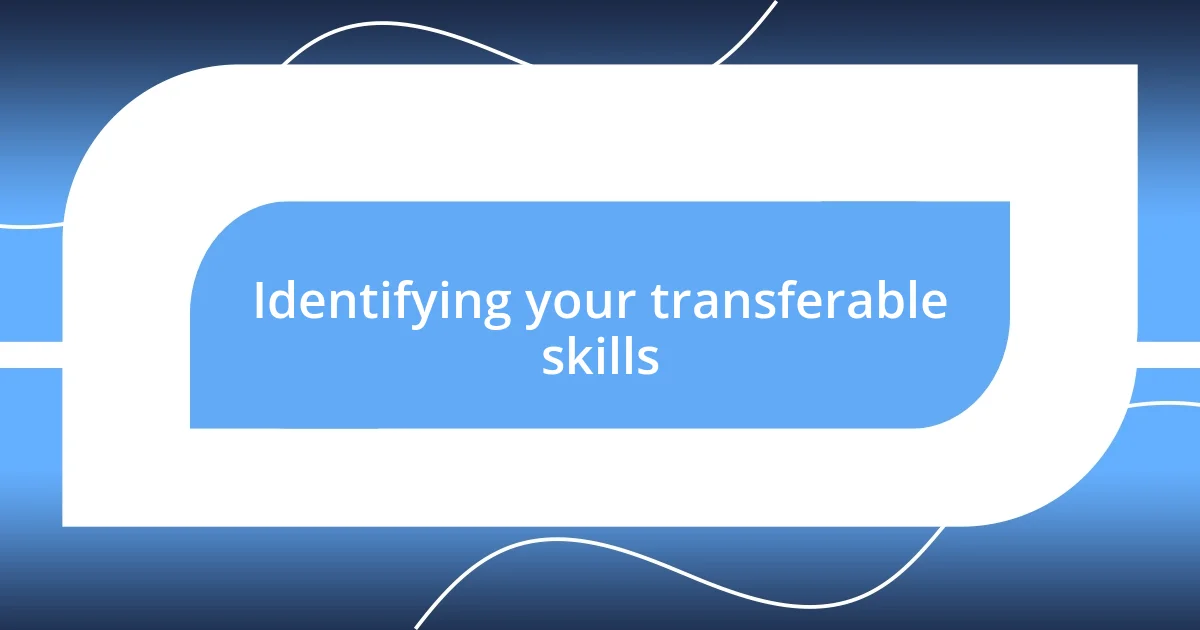
Identifying your transferable skills
Identifying transferable skills can be an eye-opening experience. It’s remarkable how many abilities I had developed without even realizing their potential beyond my immediate tasks. For example, during my years in content creation, I honed my research skills, which later proved invaluable in various settings, from writing articles to advising colleagues on project strategies. This realization encouraged me to view my skills as versatile tools that could adapt to different roles and industries.
To pinpoint your transferable skills, consider the following steps:
- Reflect on Past Experiences: List out tasks or projects in which you excelled and identify the underlying skills you used.
- Seek Feedback: Ask peers or mentors to highlight what they perceive as your strengths, illuminating skills you may overlook.
- Analyze Job Descriptions: Look for common skills in roles you’re interested in and see how they align with your current skill set.
- Create a Skills Inventory: Write down not only technical skills but also soft skills like communication, problem-solving, and teamwork.
Taking this approach not only clarifies your strengths but also builds confidence in leveraging them across various opportunities. Remember, your unique perspective stems from combining these skills in ways that others may not have considered.
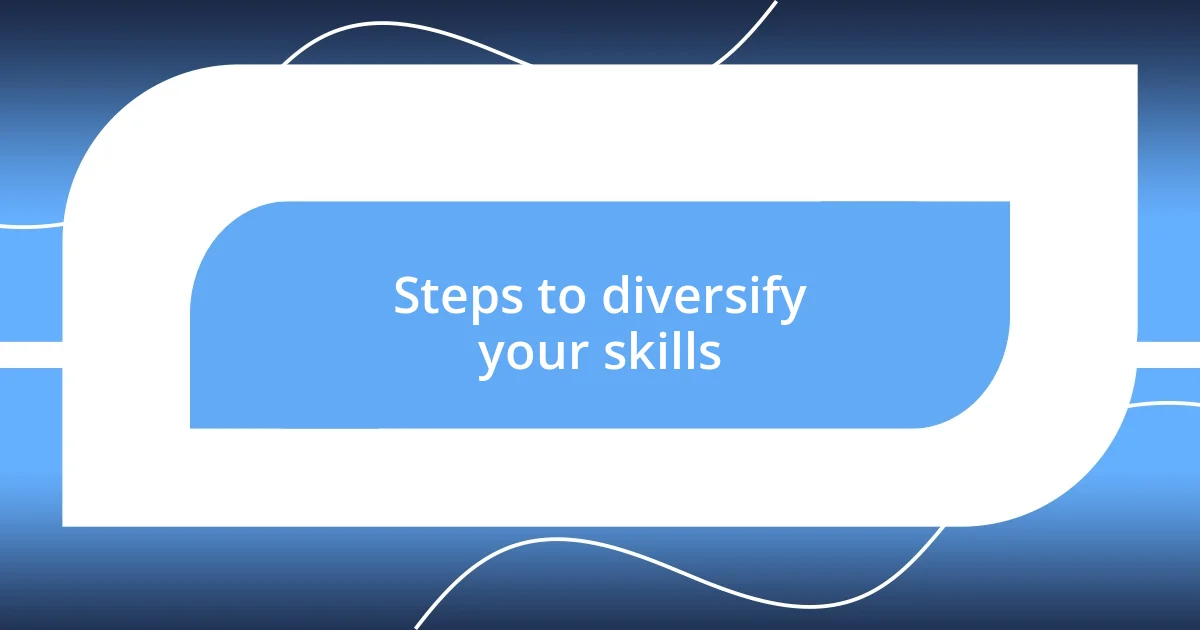
Steps to diversify your skills
The first step in diversifying your skills involves setting clear and achievable goals. When I decided to learn graphic design alongside my writing, I broke down the process into manageable tasks. This not only made the learning curve feel less daunting but also kept me motivated as I celebrated each small success. Have you ever noticed how breaking things into smaller pieces can make a big challenge seem entirely conquerable?
Next, seek out resources that speak to your learning style. Whether it’s online courses, workshops, or even casual meetups, finding a method that resonates with you can be transformative. I remember attending a local coding boot camp; the energy of being surrounded by like-minded individuals gave me both support and inspiration. What resources have you tapped into that made a difference in your learning journey?
Finally, practice is key, and I can’t stress this enough. Actively applying your new skills in real-world scenarios solidifies your learning. For instance, I volunteered to design promotional materials for a charity event, which not only tested my abilities but also gave me the joy of contributing to a meaningful cause. How have you found ways to put your new skills into practice that made the experience feel rewarding?
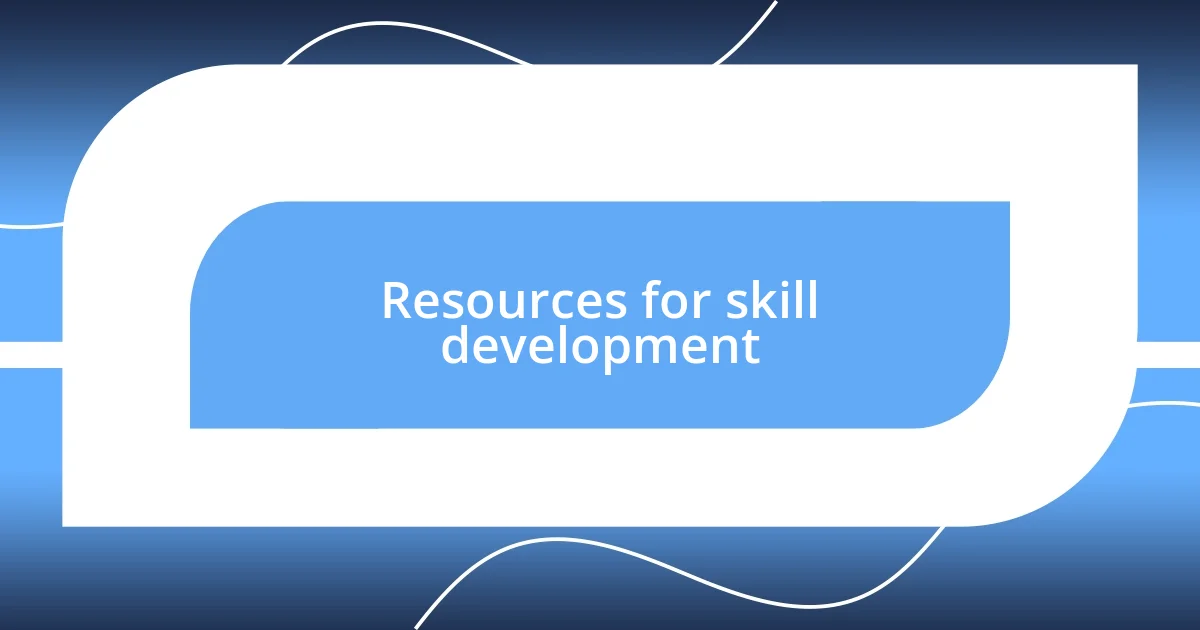
Resources for skill development
Resources play a critical role in skill development, and I’ve discovered a plethora of them throughout my journey. For instance, I once stumbled upon a platform called Coursera, where I found courses from leading universities. This not only broadened my knowledge but also helped me acquire new skills at my own pace. Have you ever felt that thrill when you finish a course? Each completed module felt like another piece in a puzzle, bringing a sense of accomplishment.
I also found invaluable resources in local community centers that offered free workshops. Attending a public speaking class was a game-changer for me. Engaging with others in a supportive environment not only built my confidence but also fostered a sense of camaraderie. The rush of delivering my first presentation was surreal—do you remember the first time you spoke in front of an audience?
Lastly, networking with professionals in my field has been incredibly rewarding. Through platforms like LinkedIn, I connected with mentors who provided guidance and shared resources tailored to my aspirations. One mentor recommended a series of podcasts that sparked my curiosity about industry trends. I often ask myself: what insights could I gain next? The exchange of knowledge through these connections truly enriched my skill diversification journey.
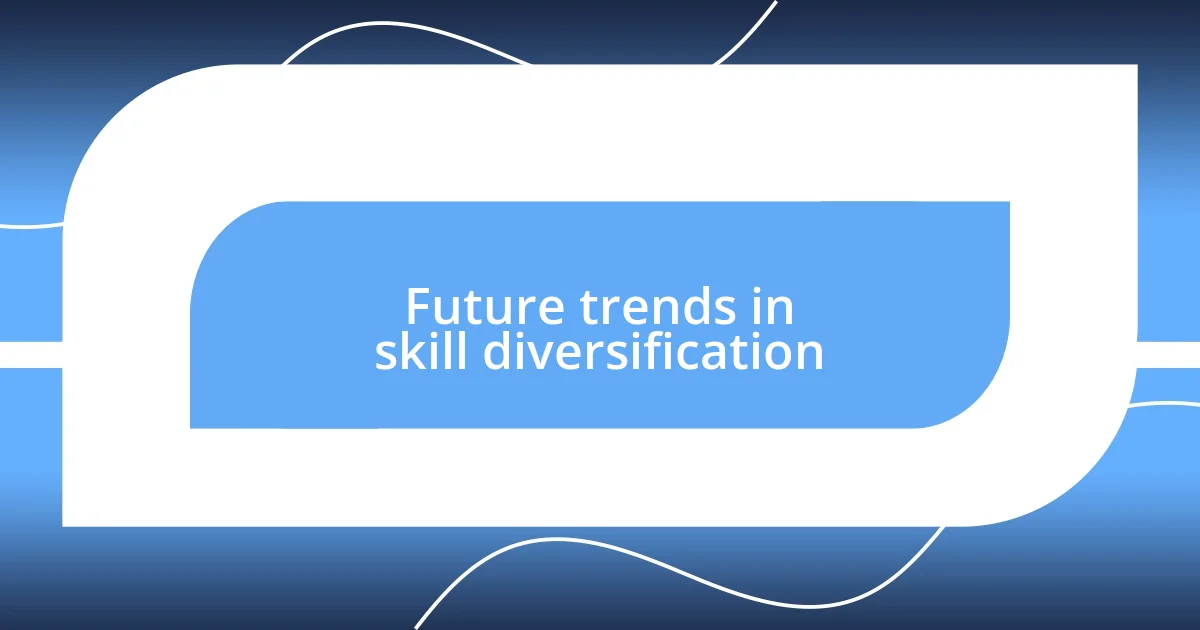
Future trends in skill diversification
Looking ahead, I see skill diversification becoming more crucial as the job market evolves. I’ve noticed a growing emphasis on interdisciplinary skills—think about how combining tech knowledge with creativity can open doors in today’s digital landscape. Have you ever thought about which unexpected skill might give you a competitive edge? Personally, dabbling in data analysis has allowed me to approach writing from a more analytical perspective, enhancing my storytelling.
The impact of technology cannot be overlooked either. With the rise of AI and automation, there’s a real need for continuous learning. I remember when I first experimented with automation tools; it’s fascinating how they can handle repetitive tasks, freeing up my time for more creative pursuits. How might you leverage technology to diversify your skill set? I think embracing tools like AI can make a significant difference.
Lastly, the future of skill diversification looks global. Remote learning has opened a world of collaboration, allowing me to connect with individuals from diverse backgrounds. I recently participated in an international project that not only challenged my skills but also enriched my perspective. Have you ever collaborated with someone from another continent? It truly broadens your understanding and prepares you for a more interconnected world.


